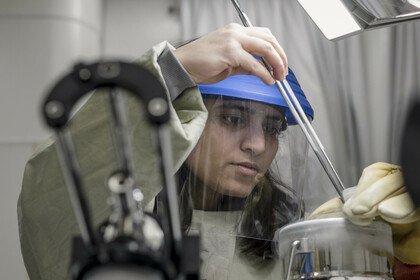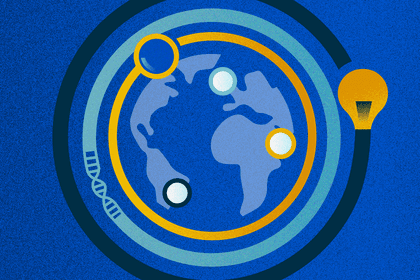
When Science Finds a Way: Our podcast
Our podcast is back with a third season, uncovering more incredible stories of how scientists and communities are tackling the urgent health challenges of our time.
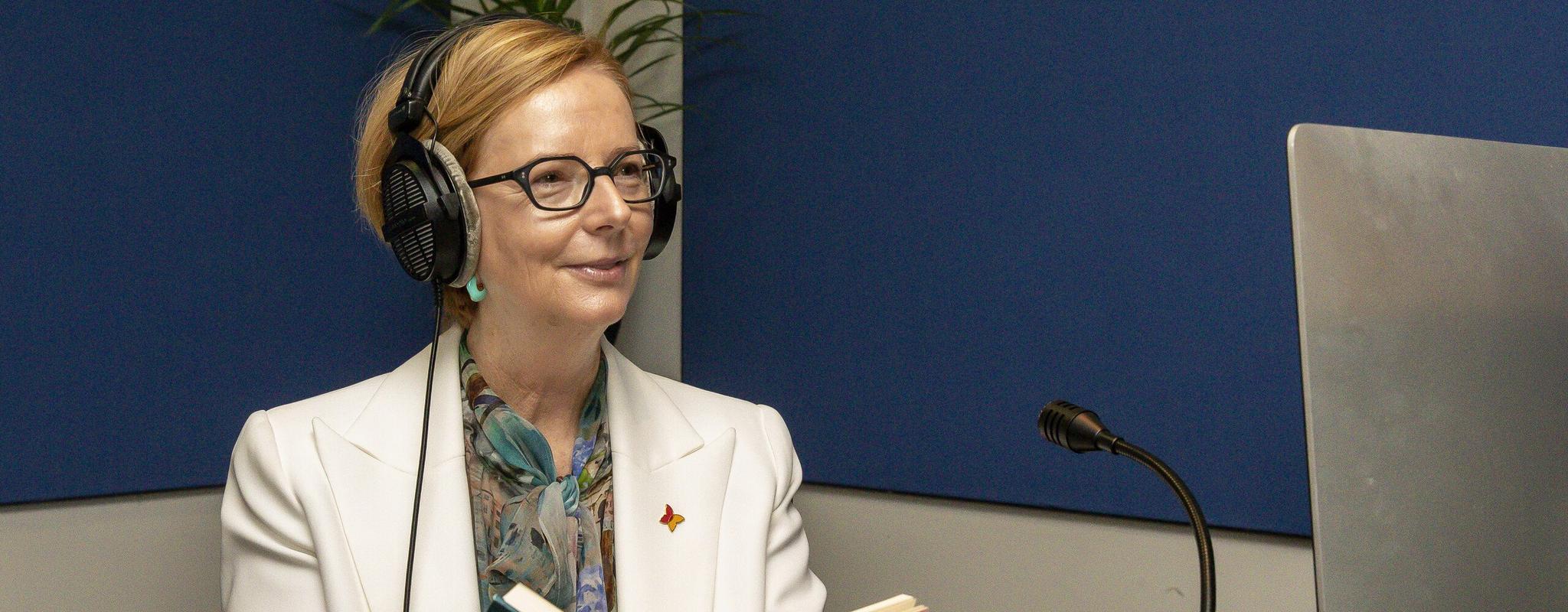
Julia Gillard, Chair of Wellcome, sits by her computer as she leads the podcast panel discussion.
Join Julia Gillard, Chair of Wellcome, as she brings together three experts from the podcast series to reflect on the main themes that have emerged and ask what challenges still lie ahead in the field of global health.
Julia Gillard, Chair of Wellcome, sits by her computer as she leads the podcast panel discussion.

When Science Finds a Way host

Guest

Guest

Guest

When Science Finds a Way host

Guest

Guest

Guest
More ways to listen
To play the podcast audio, press the space bar.
Julia Gillard 00:10
Hello and welcome to a special bonus episode of When Science Finds a Way, a podcast about the science that's changing the world.
You can probably hear that I'm not Alisha Wainwright. I'm Julia Gillard, I'm the former Prime Minister of Australia, and also Chair of Wellcome, the organisation behind this series. I'm in my office at Wellcome in London, and I'm delighted to say that I'm joined by the three global experts who featured over the last 12 episodes. They're here to help reflect on some of the themes which have emerged from the series and what challenges still lie ahead in the world of global health. Joining from Bangalore, Dr. Anand, Anandkumar, co-founder of Bugworks, a drug discovery company working to develop a new generation of antibiotics. Hi, Anand.
Anand Anandkumar 01:08
Hi, how are you? Thank you so much for having me on the show.
Julia Gillard 01:11
It’s great to have you joining, and we've also got joining from Cape Town, Professor Crick Lund, Professor of Global Mental Health and Development at King's College London. Hello, Crick.
Crick Lund 01:22
Hi, Julia, really good to be with you.
Julia Gillard 01:24
And speaking to us from Washington, DC. Kathy Baughman-McLeod, Senior Vice President and Director for the Adrienne Arsht Rockefeller Foundation Resilience Centre, otherwise known as ArschtRock, and Chair of the Extreme Heat Resilience Alliance. Hi, Kathy.
Kathy Baugham-McLeod 01:42
Good morning, good afternoon and good evening!
Julia Gillard 01:45
Wherever you are in the world, it's got to be one of those!
Now, there have been some really big themes that have come out of the episodes to date, the whole series, and I want to touch on a few of them. And the first I want to discuss is equity, and that's a theme that has come up time after time. I mean, if we look at trying to solve the health challenges for all of humanity, that does mean that we're talking about everyone, everywhere. So I guess it's unsurprising that there's been discussion about multi-country research projects, how we work with indigenous populations, how we make sure that everyone's included. How have each of you seen this theme of equity? Has it made you ask yourself some questions about science and how we view it in our world? I might, Kathy, go to you first.
Kathy Baugham-McLeod 02:39
My field is climate impacts and climate resilience. And so, as tangible as blisters on the hands of women in the informal sector in India with whom we work, it's so obvious how inequality lands on their daily lives and reduces their income. And they had zero to do with creating climate change, and yet bear it in their hands. And so the inequality is just slapping me in the face almost every day, and the way that we think about how science can quickly be disseminated and turned into tangible solutions and financial flows is exciting, because we know we can do it, and also as urgent as it could possibly be.
Julia Gillard 03:24
Anand, you're very much agreeing with all of that, I can see that, very animated. How does it feel to you, this theme of equity across science?
Anand Anandkumar 03:34
I think Kathy laid out beautifully. I'd like to explain, or give, the response to such an important question through the work I do. We're working on superbugs, drug resistant superbugs. And there's an 80/20 rule at play. Right? 80% of the problem in infectious diseases happens in the low to medium income countries, 20% happens in the Western countries, yet the market is exactly inverse, that 80% of the market capture happens in the West, and 20% is in the LMIC's. So there is really no interest for the large pharmaceutical companies to do research in areas like infectious diseases. Why? Because they are serving large populations, but the market size is not good. So we decided to do a company that would solve this inequity if you will, to make drugs affordable and accessible, where it's required, whether it's parts of Africa, Southeast Asia, now the rest, even now we know that no one is safe, and everyone is safe. We learned that lesson in COVID. We created a company that's based in the United States, Australia, South Africa, India, because no one country can solve this problem. So I think as a researcher, we realised that solutions have to come from everyone. But we made a base sitting in India. So we are close to the action, we are close to where contextual innovation needs to happen to serve underserved society. So take a global play, use the best pockets of global competence, coming together, but constantly look at affordability and accessibility when you do research, or else that science is really not a very purposeful science.
Julia Gillard 05:10
And Crick, what do you think about this theme of equity? It's obviously core to the research that you do.
Crick Lund 05:10
Yes, absolutely. I mean, I think it's really important that we shift the way in which we configure global health research partnerships, and especially in the case of mental health, these have largely been led from high income countries in the past, and I see a real shift in the whole field of global mental health towards more leadership, by low and middle income country academic partners. We've seen that in a major way in our field. There's a need, I think, for more willingness by Northern partners to support and not lead, and also, critically, to integrate capacity building into research grants, and especially in low resource settings. And that includes not only building the capacity of individuals, but also building the capacity of institutions. So I think this is the way in which we need to reconfigure global health research partnerships, not only about the research, and certainly not only about being led by Northern partners, but really trying to use them as a vehicle for empowering and building capacity in low resource settings.
Julia Gillard 06:22
I think some really interesting breakout themes have come from that. I mean, Kathy, you obviously talked about who the research is for, Crick, you've talked about who's doing the research, and Anand, you've spoken about being close to where the action is, so the research being in communities that are most affected. I mean, is there a dimension of this, too, which is about forging links with those who have lived experience of the very problems the science is trying to solve? Anand what do you think around that?
Anand Anandkumar 06:55
Think about it, right? There is about 5 million deaths per year, owing to drug resistant infection. And about 30% happened, say from India – the clinicians who are sitting here are seeing patients, hundreds of patients per day, and none of the antibiotics work. And so they lose patients to very bad nasty bugs, they lose babies to neonatal sepsis, pregnant women who deliver, etc, etc. Right? So when we hear, close to patients and close to clinicians, we understand the use models that are required. One of the reasons we have been able to crack the superbug is access to superbugs. So make weapons next to the battlefield, when you can see your enemy and understand your enemy better, is the sort of philosophy I'd like to espouse.
Julia Gillard 07:39
And Kathy, were you going to come in there?
Kathy Baugham-McLeod 07:42
Well, I was just thinking about how you're saying, doing these interventions, and the science with the beneficiaries and the community in mind. And what we find is that communities know exactly what they need. And so, yes, the science underpins that but so often the solution is already available and known to the community, and so we're have been most successful in starting with the community and understanding what is needed, and then using the science combined with the lived experience for the best solution. And I want to underscore the urgency you know, from our perspective and back to the equity question, you know, a woman is 14 times more likely to die in a disaster of climate-driven disaster, and for lots of reasons: physiological reasons for extreme heat, or the clothing that women wear, not taught to swim, responsible for the animals, have to go get the water, you know, this list goes on and on. And I think we on the on the podcast know this, but when you think about what is needed, usually, the community knows and we can edify those solutions with the science and of course, getting to replication and scaling so we can reach as many people as we can. But I just want to note that that connection of what the community knows so well inherently what is needed, and then bringing the science in to refine it and replicate it and improve it.
Julia Gillard 09:06
Sitting here in the UK, one of the favourite examples of mine about how community can interact with research is the Born in Bradford project, where scientists over a long period of time have worked with a community. And it's all become so embedded locally that kids are literally talking about it in the playground. I mean, that's a dimension to science, I think, that isn't commonly exposed. But it does mean that if there's a real partnership between community and scientists that you get some very special results. Crick, your research really takes us to this, you've reached out across those silos. I mean, how hard is it for science to do that?
Crick Lund 09:50
I think it's absolutely vital that science should be doing this. For too long, people living with mental health conditions have been the subject of research rather than participating in the research, as people who have direct first-hand experience of what it's like to live with, for example, psychosis or depression or anxiety. And we're seeing some really exciting developments in the field, moving away from kind of tokenistic participation of people with lived experience. I think we're seeing more inclusion of people with lived experience early in the grant development process. So increasingly, researchers reaching out to people with lived experience when they're formulating the research question and applying for research funding. I think this needs to happen more, I think what we are trying to move towards is building meaningful relationships with organisations over time, not just one-off events with individuals. And then the third is through building feedback loops into the research that we do. So for example, in the ALIVE programme – so ALIVE stands for improving adolescent mental health by reducing the impact of poverty. And we have an adolescent advisory group in each country in which we're working, in Bogota, in Colombia, Cape Town in South Africa, and Kathmandu, in Nepal. And these adolescent advisory groups meet every two or three months. And we asked them about our research process and we get their input, then we go back to them after we’ve heard their response. And we talked to them about how we've used their suggestions and how we're incorporating this, and it's been incredibly informative, and energising for all of us to be engaged in this process. So I think there are lots of possibilities, especially in the field of mental health, for engaging in a much more meaningful way with people with lived experience and building these partnerships.
Julia Gillard 11:36
But it’s not just that connection into community is it? It’s that connection that science needs right across the board. And when we're thinking about busting through silos and connecting people up, what about the connections with policymakers? So, how much more do we need to do to improve the relationship between sites and policymakers, so something can be implemented and scaled when we know that it's going to make a profound difference? Kathy.
Kathy Baugham-McLeod 12:09
I have found using strategic communications and finding policymakers and former policymakers like yourself to take on and endorse so that other policymakers who speak that language – they may not speak the scientific language, but they speak policy language – and when you use strategic communications to build a narrative around what the science can do in terms of policy and what good policy looks like, we found some success in that way. there's always a story that goes with what a policy is, and, of course, the policy underpinned by science. And so we've really leaned on strategic communications, as we have tried to elevate the understanding of the dangers of extreme heat because of its silent and invisible nature as a climate hazard. And so, I offer that as something that we lean on pretty heavily.
Julia Gillard 13:03
And Crick, what about in your work?
Crick Lund 13:05
Yeah, so for me, you know, the relationship with the heat between researchers and policymakers is incredibly important. And to build relationships of trust, over time, is really key to making this conversation. So it's not about researchers coming along and saying to policymakers, “you should be doing X and Y”. It's about having a conversation together about well, what are your policy priorities? And how could this particular research endeavour answer those particular policy questions?
Julia Gillard 13:33
Anand, your model really is sort of busting through how the private sector would do it left to itself. How do you think about connections with policymakers, and I guess, with the private sector itself, to think through distribution models and where changes are needed, where we need to be fighting these superbugs?
Anand Anandkumar 13:55
So good science and good policy are two sides of the same coin. So good science cannot reach the people it's intended to serve. If you don't have strong policy backbones, it's that tightly interlinked. If you look at the superbug problem, it's a one health problem. It impacts humans, animals, environment, all of these require policy intervention, strict policy interventions. So without those policies – we call them stewardship – without those stewardship policies, any innovation that we do, will get completely blasted. Because bacteria and viruses are much smarter than us, the more you use and abuse, you lose it. So policy is very, very strong, so it's great to see policymakers, particularly in developed nations, looking at supplementing, augmenting, helping innovation by providing new business models. So policy on the business side is just as important as policy on the use side, that ensures that those resources that we have stay long, a long time through the stewardship model. So I think it's very key. I would like to see much closer cooperation at the G7 and G20 level between finance ministers and health ministers. That connection has to become much better because I think the rubber meets the road in terms of funding important policy only when these G20-level finance and health ministers talk much the same language. So that would be a recommendation.
Julia Gillard 15:23
In my experience, often finance ministers and health ministers aren't best friends because the health ministers are always asking the finance minister for more money! But Crick, what's your perspective on finance ministers and health ministers?
Crick Lund 15:40
Yeah, I mean, I just really agree with what Anand was saying, you know about the importance of bringing different ministries together into the conversation. Often we find ourselves in the mental health field lobbying ministries of health, but increasingly, you know, the evidence is that mental health at a population level is driven by the social and economic circumstances of those populations. And those are not going to be influenced substantially by the Ministry of Health. We already need the national treasury, we need ministries of social development, education, housing, all around the table talking about this very cross-cutting issue of mental health. And you know, when we restrict ourselves to particular silos, that really limits the potential policy impact of the research we do. So this is something we're trying to do more of. And it's really interesting to hear Anand’s comments about that in relation to his field.
Julia Gillard 16:30
And Kathy, presumably, we need climate ministers too?
Kathy Baugham-McLeod 16:34
We definitely need climate ministers. But we have to have the climate ministers and the finance ministers and everybody has to be arm-in-arm. And I think the economic impacts and analyses and looking at the way the economy is affected by all of these things that we're talking about – you know, of course, in my world, it's climate impacts and investing in climate resilience. And, of course, the transition to a low-carbon future. But the policy-science nexus needs to also be topped off with some financial analysis, so that we have an understanding of the risk, and also the upside, what do we achieve by making these investments in public health and climate resilience in an energy transition that's just. And so I want to bring in, we've worked closely with Vivid Economics, and they've been able to help us really jump some policy to the front of the line with some wonderful data that's pretty eye-popping, that helps us understand the cost of extreme heat to worker productivity. And in two separate settings, I'll say any worker in New Delhi who works outside loses a quarter of their income every single day because of the heat. And in Miami Dade County – very different setting – $10 billion annual budget, the cost of heat to worker productivity in Miami Dade County? $10 billion. So the same amount as the county budget is lost to heat. And those numbers help policymakers but especially finance ministers really pay attention to think about what the risks are and the opportunities.
Julia Gillard 18:08
That's an incredibly good point that often we don't do the full evaluation. I mean, what pops in people's eyes is the cost of an intervention rather than looking at the benefits and really doing the full sweep as to what could be gained. I want to talk now a little bit more about research, and particularly what we at Wellcome would refer to as discovery research. People might refer to it as transformative research. But basically, it's ambitious, curiosity-driven, open-ended. It's scientists who think they have a good idea, they do have a good idea, and they pursue that science, and it can take them in all sorts of incredible directions. We've heard it numerous times across the series. For example, Susan Golombok, who's dedicated her career to studying same sex couples. I'd be interested in your views about this kind of very open, curiosity-driven science. What kind of mentality is needed for people to lead research like that? And what can we learn from that curiosity-driven approach to the world and the incredible tangible benefits that ultimately brings? I mean, some of the biggest scientific advancements in human history have come because the scientist fell in love with a problem.
Kathy Baugham-McLeod 19:30
I will say it first, that you need an institution like Wellcome that embraces that approach, that the openness and the curiosity and the wonder that comes with discovering things that lead to other things in a fast paced, pressured, stressed out world. And then to answer it, I think immediately of one of your partners at Wellcome, Professor Ollie Jay, with a set of research in a lab that helps understand how the human bodies and different conditions of how they react, or looking even inside how a stroller for a baby with a sunshade over it turns into a bit of a convection oven in heat conditions. And so that bit of understanding how the human body is reacting to heat means that he can understand that strollers are dangerous when you put the shade over, and can create more heat inside for your baby. And so the curiosity of the human body and its reaction to heat means that we now have much more safety public information about how to think about the baby stroller on a hot day. So yeah, lots of things come out where you start in one place, you end up in someplace different.
Julia Gillard 20:38
Well, you've won my heart mentioning an Australian researcher, thank you for that.
And, Anand, in your field, curiosity-driven research, discovery research?
Anand Anandkumar 20:49
Curiosity equals chaos equals passion. That kind of sums up how we work. I'm a semiconductor engineer. And on one of my trips to London, I was looking at the London Metro, and looking at how those complex trains in your subways are organised, etc. and had some ideas about how we can use network biology, from the semiconductor industry into the systems biology industry. That's how Cellworks, my previous company, got founded, and that Bugworks from Cellworks came out. And today we're working on antibiotics and oncology drugs that are affordable and accessible. So I think it's institutions like Wellcome Trust, Bill and Melinda Gates Foundation, and others, who are basically able to provide that fertile ground and the fertiliser, the natural fertiliser and the water required to allow ideas to come out. And when those good ideas are married, with a passion of wanting to do good for humanity, it's that synergy that really keeps us all up in the night. Today, you have computer scientists, data scientists, biologists, you know, clinicians all coming together to solve these problems. So it's exciting times.
Julia Gillard 21:57
Anand, a burst of inspiration, looking at a tube map. That's fantastic. The London Underground, I love it. What about you Crick? What do you think?
Crick Lund 22:05
You know, I've been really interested for many years now in this link between mental health and poverty. And what Wellcome has allowed us to do is to bring together an interdisciplinary team. So we have economists, neuropsychologists, mental health specialists, community-based organisations, all trying to think together, trying to get across our siloed ways of expressing ourselves, to come up to solutions which would not have been possible if we had not put these things together. So it's incredibly exciting to be in this space and, and especially to focus on prevention because there's so much research which has gone into treatment, and that has the potential for massive population-level impact. So, very, very exciting to be in this space at the moment.
Julia Gillard 22:46
It's terrific to hear about all of that. Unfortunately, our time together is growing a bit short, though. So I did want to wrap up by asking each of you to look to the future. And just to give a perspective on what are the challenges that still lie ahead for global health? I know it's a big question. I guess it's a way of asking you, what's keeping you up at night? What should we be thinking about? Crick? Would you like to start?
Crick Lund 23:12
So one of the things that really concerns me, and it's a massive challenge going forward, is the level of inequity in wealth and resourcing both between and within countries. And I think this is a huge driver in our field of mental health problems, but it's also reflective of a range of other things, you know, from everything from climate change, through to antimicrobials. You know, these are all issues which are strongly influenced by inequities. And I think the more that we can be doing to think about solutions to social and economic upstream drivers of mental health, the better we are likely to do in relation to improving mental health over time. The second big one, for me, is growing conflict. And this really worrying situation in Ukraine, Sudan, DRC. At the moment, these are all big health challenges, because they lead to a whole lot of other negative health impacts. And then, of course, climate change. From a mental health perspective, climate change is a massive threat. And we need to be thinking more about how we mitigate the effects of climate change on population mental health.
Julia Gillard 24:18
Kathy, there's the climate change opening, I'm passing the baton to you.
Kathy Baugham-McLeod 24:24
Well, you'll see across all of the big institutions and foundations, that climate is being folded into every single pillar, food pillars, health pillars, innovative finance pillars, and the challenge for public health going forward will be to really understand the physical, mental health aspects of climate – and we work with climate psychiatrists and climate psychologists – and thinking about the impacts of climate change. I think, if we know that, as humans, that we are, in some ways, very feeble-minded, in the way that we see climate, we see exactly why it's happening, how to fix it, we have the capital, and we have the policy – and yet, as humans, in the way that we're organising our governance, we don't have the political leadership that we need to address it. What does that mean for all of our systems that we're talking about, for science, for policy, for health, for finance – and if we address these inequalities, we would be addressing climate change. And I think having women in leadership across the world, and at least 50% of the positions of decision-making, would be a huge step forward. But as we look ahead, will we meet that challenge of addressing the underlying drivers of climate change? And being honest with ourselves, that we may not do it in the time that we need to? And what does that mean for people suffering the most from it? And where does the science, the policy, and the finance come in?
Julia Gillard 26:01
Absolutely, and Anand?
Dr Anand Anandkumar 26:02
What keeps me up at night, actually, is the climate, health, inequity connection. It's so unbelievably connected. I don't think climate is a single problem. I think it's pretty much interspersed into everything else. And the areas I look at, such as infectious diseases, displaced populations, which are displaced by climatic problems, or problems by poverty within a country, or going to wars, like Professor Crick was mentioning, displaced populations will be the biggest spreader of massive diseases. That's a huge problem right? The second thing that keeps me up at night is the way we as 8.3 billion people in humanity are going after animal protein. The animal protein problem, the livestock problem, is one of the largest problems that is impacting climate. So if we continue to go the way we are, industrialised livestock, animal feed, we will wipe out forests. And we'll probably only have corn left as a staple, sorry to say so. So I think climate impacting displacement of populations, impacting the spread of nasty infectious diseases, like we saw with COVID, and potentially others that will come – all of these are part of the same problem. And unless policymakers come together and prioritise health and climate, I think we are in for big trouble. And I couldn't agree more, that we need more than 50% women leaders, whether it's in the G7, G20, Prime Minister, President levels, it will be a much kinder, better place to live in the world.
Julia Gillard 27:34
Anand, what you've just said really reminds us about how interconnected research areas are, how interconnected things are that climate, health, people displacement, all of these things come together. And we've always got to remember that we need to be working in an interconnected way, as well. So thank you for reminding us of that. And of course, I'm gonna say a very big yes to 50% women leaders.
Kathy Baugham-McLeod 28:04
I know, you know, that everybody wins when we invest in women and their leadership. But I also want to say that as we see all of these challenges, and how interconnected they are, we also have made so much progress. There are so many new tools underpinned by science and women and leaders from all types of communities showing up in decision-making. So we're making progress. And we do have the science and the money that we need. So much of this is coming from the youth. And so we have seen so many positive signs, and the youth activists around climate change really have changed the narrative. And so I don't want to leave us on a negative note, there are big, big challenges and lots and lots of solutions. And so we also know that the number one way that we survive disasters is when we know our neighbours and so building our community and being close to people means we can take this on and win.
Julia Gillard 29:09
Big challenges, big changes and science finding a way. So that's the right point, I think, to end this episode, and this first series of When Science Finds a Way.
I do want to thank, so much, my very brilliant guests for their contributions. Thank you to Dr. Anand, Anandkumar, to Kathy Baughman-McLeod, and to Professor Crick Lund. If you haven't yet heard the whole of this first series, do go back and listen to all the episodes. It's a great listen, and hopefully, it will get you inspired about what science can achieve.
When Science Finds a Way is brought to you by Wellcome. Please visit our website, wellcome.org. – that's Wellcome with two L's – you'll find a whole host of information about this series, the topics we've covered, and full transcripts of the episodes. And if you've enjoyed listening to When Science Finds a Way, be sure to rate and review us in your podcast app. You can also tell us what you think on social media, just tag Wellcome Trust – remember that's with two L's in Wellcome – to join the conversation. When Science Finds a Way is a Chalk and Blade production for Wellcome – a global charitable foundation that supports science to solve the urgent health challenges facing everyone.
Throughout this podcast series, we've met trailblazing scientists and researchers changing the world, alongside the people who have inspired and contributed to their work.
In this final bonus episode, Julia Gillard, Chair of Wellcome, brings together three experts from the series to reflect on the main themes that have emerged and ask what challenges still lie ahead in the field of global health.
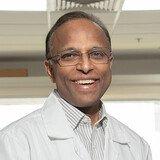
Dr. Anand Anandkumar
Co-founder of Bugworks
Dr. Anand Anandkumar is an engineer turned biomedical researcher. He co-founded Bugworks in 2014, a company that aims to discover novel treatment options for resistant bacterial infections. As our current generation of antibiotics become less and less effective at treating infections worldwide, Bugworks is one of a handful of groups worldwide working on what they hope will become a next-generation broad-spectrum antibiotic – an antibiotic that acts on the two big bacterial groups. This work is part-funded by Wellcome.
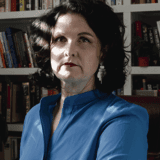
Kathy Baughman McLeod
Former Director, Adrienne Arsht-Rockefeller Foundation Resilience Center
Kathy Baugham-McLeod is the former Senior Vice President and Director for the Adrienne Arsht-Rockefeller Foundation Resilience Center and Chair of the Extreme Heat Resilience Alliance. Prior to this, she was Senior Vice President for Global Environmental and Social Risk for Bank of America, and Managing Director for Climate Risk and Resilience for the Nature Conservancy – a global environmental non-profit – during which time she produced a documentary about coastal communities adapting to climate change.
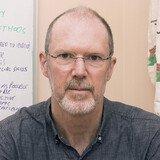
Professor Crick Lund
Professor of Global Mental Health and Development, King's College London
Professor Crick Lund trained as a clinical psychologist at the University of Cape Town and was subsequently involved in developing mental health policy guidelines for the National Department of Health and the WHO. He was a founding member of the Alan J Flisher Centre for Public Mental Health at the University of Cape Town and CEO of the Programme for Improving Mental Health Care (PRIME). His research interests lie in mental health policy, service planning and the relationship between poverty and mental health in low- and middle-income countries.

Our podcast is back with a third season, uncovering more incredible stories of how scientists and communities are tackling the urgent health challenges of our time.
